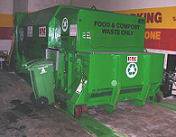 Turning food waste…into wine? In a roundabout way, that is what is happening to the composted food scraps and other items generated at the 1,498-room San Francisco Marriott hotel. The real story here is not the wine but the effort Randy Nelson and the other associates at the San Francisco Marriott have made to divert as much food waste from landfills as possible…
Turning food waste…into wine? In a roundabout way, that is what is happening to the composted food scraps and other items generated at the 1,498-room San Francisco Marriott hotel. The real story here is not the wine but the effort Randy Nelson and the other associates at the San Francisco Marriott have made to divert as much food waste from landfills as possible…
Once hauled away by Golden Gate Recycling, the waste is taken to an organic composting facility where it is ground up, heated and converted to nutrient-rich mulch. Many vineyards in Napa Valley then use that mulch to help grow grapes.
In 2004, 500,000 pounds was compacted, hauled away, and then composted off site. In 2005, 750,000 pounds was diverted from the waste stream.
‘Our goal is 1 million pounds a year,’ says Nelson, full-time recycling coordinator at the busy hotel that features multiple restaurants and cafeterias where food waste is generated.
Compostables collected include food scraps, paper cups, napkins, waxed cartons and waxed cardboard; almost everything but plastic, metal or glass. The items are placed in 32-gallon containers and then wheeled to the loading dock where they are emptied into the hotel’s compactor. The 20-yard capacity machine occupies 400 square feet of loading dock space.
Golden Gate Recycling hauls the compacted material away every five to six days. Left to sit any longer than that would be an odorous error, Nelson says. About 15,000 to 17,000 pounds of food waste is taken each time. Even meat and meat bones are part of the mix.
The San Francisco Marriott currently leases the compactor for around $500 a month. The money not spent taking the waste to a landfill pays for the program. The hotel is able to recycle food waste because the city of San Francisco offers a mulching option.
‘Our composting effort is a commitment to the city of San Francisco,’ Nelson says. ‘It is also good for business. We set up our system so that really is not a lot of extra work.’
Nelson says he helped launch the composting program in April 2003 in conjunction with Earth Day. At first, food waste was collected only in restaurant areas. In 2005, however, the program was expanded to the employee cafeteria where approximately 1,300 employees dine daily. Five hundred pounds of food waste is collected there each day for composting.
Associates at the hotel are reminded about recycling via posters and handouts.
‘I created a talking points list for managers,’ Nelson says. ‘I do the initial education first but it later becomes part of each manager’s responsibility to remind associates. When there is a transition in managers, there can be a bit of a backslide.’
The cafeteria is the focal point of associate education. For the most recent Earth Day and as part of Marriott International’s Environmental Awareness Month, Nelson and his staff put on a Green Game Show in the employee cafeteria to remind associates about the importance of recycling.
The San Francisco Marriott was the first hotel in San Francisco to have a compactor dedicated to compostables. Nelson says that any hotel can start a composting program but it needs to be large enough to warrant the investment in the type of compactor the San Francisco Marriott uses. Since launching its program, other area hotels have followed the Marriott’s example.
Prior to working as recycling coordinator, Nelson worked as a supervisor in another part of the hotel. In 2001, he was able to convince management that recycling alone could pay for a new recycling coordinator position. Five years later, the hotel’s composting program is growing by leaps and ‘mounds.’ At the same time, Napa Valley’s wine makers are using the sweet mulch to grow grapes for the best tasting wine in the world.
For more information on the San Francisco Marriott’s composting program, contact randall.nelson (at) marriott.com.
This article first appeared on the Green Lodging News website. To sign up to receive the weekly Green Lodging News newsletter, go to www.greenlodgingnews.com. Glenn Hasek can be reached at greenlodgingnews (at) aol.com.



















